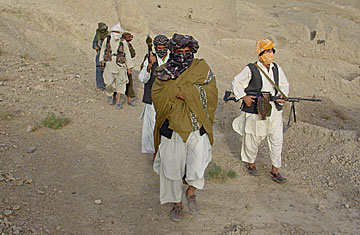
Taliban spokesman Zabiullah Mujahid leads his group in the mountains of volatile Helmand province
(2 of 2)
Taliban spokesman Zaibullah Mujahid took it a step further, telling TIME by telephone that "no one from the Islamic Emirate of Afghanistan [the name of the country under Taliban rule from 1996-2001] is ready to negotiate with this government. The conditions that the government and the Americans offer is that the Taliban accept the constitution and the presence of American and other foreign troops in Afghanistan. Our condition would be the withdrawal of all foreign troops, and without that we are not ready to negotiate."
While the relationship between the Taliban and al-Qaeda has frayed over the years, bin Laden's group is still a principal financial supporter, and as such would have input on major decisions that the Taliban make. Needless to say, it will be impossible for any negotiations to take place unless the Taliban renounce all ties with the terrorist group. That's an unlikely scenario, says Zaeef. "I am not sure the Taliban will say to al-Qaeda, 'Leave the country and don't support us,' because there is no one else funding the Taliban, so there is no way they would beak with their key supporters."
Disaffection Inside the Taliban
Even if Taliban leader Mullah Omar and Karzai were able to overcome their glaring differences to hammer out a power-sharing agreement, the real question would be: How much power could Mullah Omar actually wield?
While he does hold sway over a large mass of the former Taliban command structure, which has largely taken refuge in Pakistan's lawless mountain sanctuaries, the bulk of what is currently known as the Taliban in Afghanistan is made up of disaffected and alienated bands of Pashtun tribesmen who have been leveraged out of their traditional power bases and are disillusioned by the increasingly corrupt and ineffective government in Kabul. The only point that these groups — some of which are made up of opportunistic criminals, narcotics kingpins and smugglers — can agree on is that they are against the Afghan government.
Any true reconciliation would have to include these groups, as well as the Taliban leadership, and that is an almost inconceivable task. "The West tends to imagine a rather more coherent organization than the Taliban really is," says Joanna Nathan, Afghanistan analyst for the International Crisis Group. "They imagine there is a single element of control over a wider organization. This view that it is somehow going to be Mullah Omar sitting at one end of the table while President Karzai sits at the other as they sign a power-sharing agreement and we can all go home — that is a fantasy."
A better strategy might be to cut at the roots of this dissatisfaction with the central government. The Taliban has capitalized on widespread disillusion with corrupt, centrally appointed officials to recruit to its cause. Few Afghans feel that they have an adequate outlet for settling grievances, like land disputes, so they are more likely to turn to Taliban courts that have sprung up in government vacuums. Real reconciliation, says Nathan, should be taking place at the grass roots, with Afghans who have become alienated from the government. If they can be persuaded that the government is looking after their needs, they are less likely to support the Taliban.
This approach would also be much more palatable to Afghans from the largely non-Pashtun north, who bitterly fought Taliban rule during the civil war and are more likely to launch another war than submit to a Taliban-led government. The Taliban today operate in virtually every Afghan province, and in several places they have been able to create a parallel system of government, but they do not have the support of a majority of Afghans. Most still vividly remember the deprivations of Taliban rule, and if given a choice, they would prefer their current situation to that of eight years ago. The international community has already wasted seven years and billions of dollars in failed attempts to reverse the depredations of Taliban rule; a far better solution to the Talibans' resurgence would be correcting the mistakes of the past and delivering, for once, on international promises of democracy and development.
— With reporting by Ali Safi / Kabul
(Click here to see Hidden Afghanistan.)